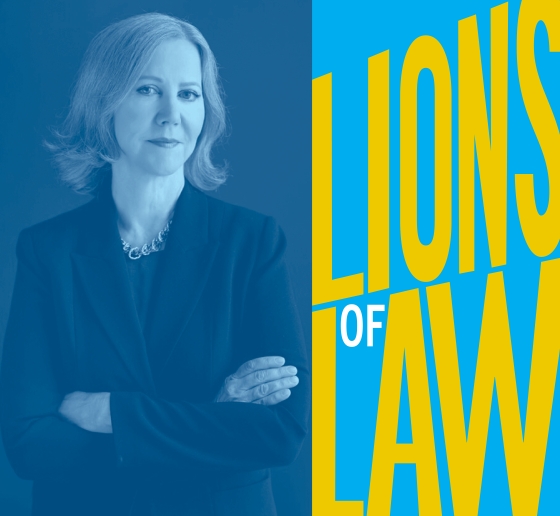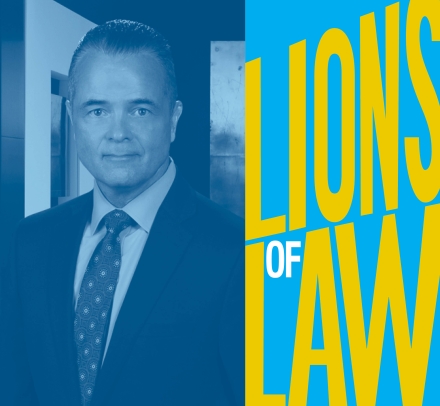Nancy Northup ’88: Leading the Fight for Reproductive Rights Before, During, and After ‘Dobbs’
The president and CEO of the Center for Reproductive Rights works to advance what she calls “a fundamental human right” around the world.

When Nancy Northup ’88 began as CEO of the Center for Reproductive Rights in 2003, the U.S. was 30 years into constitutional protection of the right to an abortion, recognized by the Supreme Court in Roe v. Wade in 1973. Support for her mission—leading the center to use the power of the law to advance reproductive rights as a fundamental human right around the world—didn’t seem to be on the front burner of those in her legal circles, Northup says.
“In those early years, there was maybe some head nodding, but kind of silence, you know, at what I was doing,” she says with a small laugh.
Not now. The Supreme Court reversed Roe in 2022 with its decision in Dobbs v. Jackson Women’s Health Organization, ending the federal constitutional right to an abortion in the United States. Now, when she meets supporters of the center (which represented the health clinic in the Dobbs case), they “express their outrage at the decision—and are very clear about supporting reproductive rights generally and abortion rights specifically,” she says. “We have always worked on a whole set of issues: contraception, safe maternity care, abortion care, fertility care, all of it. … People are really understanding that it is tied together in the concept of reproductive autonomy.”
As the center’s president and CEO, Northup is a highly visible advocate, appearing frequently in the media and testifying before Congress. During her two decades as the center’s leader, she has also grown the organization’s annual budget from $6 million to more than $65 million annually and its staff to 270 employees and a cadre of about 1,000 lawyers around the world—including Columbia Law classmates—who work pro bono on cases. She has expanded the center’s international work, opening offices in Colombia, Kenya, and Switzerland. The U.S., she points out, is a global anomaly in restricting abortion—one of just four countries where abortion rights have narrowed in the past 30 years, compared with 60 countries that have liberalized abortion laws.
“In every area of the law, ideas cross borders, concepts cross borders. That is true in rights-based work as well. And the need is there,” she says. “Whether you survive pregnancy or not hugely depends on what the medical infrastructure is, and what the rights and protections are, in a particular area. So it’s a huge issue for gender equality everywhere in the world.”
A Changed Landscape
The Dobbs decision and subsequent legislation in 14 states that bans abortion in almost all circumstances have galvanized the issue of reproductive rights, putting it in the news, in the courts, and on the ballot. “The suffering in those states is huge,” Northup says.
She and her organization remain at the heart of the effort. Since the Dobbs ruling, Northup notes, the center’s focus has shifted from federal to state litigation, seeking to clarify new, restrictive, state abortion laws. The center sued to clarify Texas’ “emergency medical exception” standards for abortion, a challenge rejected by the state’s Supreme Court; litigation is ongoing in other states. The center also filed amicus briefs in a challenge to federal approval of the abortion drug mifepristone, which was rejected by the Supreme Court in June, and in a case challenging emergency abortions in hospitals that was dismissed by the court on June 27.
The shift also includes a move from representing clinics and health care providers to representing individuals, including the women in the Texas case who were denied abortions despite serious medical complications.
At the same time, the center is working to support abortion rights at the state level. For example, in Michigan—where the center had represented abortion clinics for “all 32 years of our history,” says Northup—voters in 2022 considered a ballot initiative that would amend the state constitution to protect “reproductive freedom.” Northup went to Detroit to await the vote results with the clinic client, and recalls the satisfaction of hearing that the measure won “and realizing, wow, there’s a lot of these lawsuits that will never have to be brought again because the right is now guaranteed.”
Putting Human Rights Study Into Practice
Under her leadership, the center has been a global leader in framing reproductive rights as a human rights issue. The goal, she says, has been “to apply the human rights frameworks that may have been developed in other contexts, and see how they’re applicable in women’s lives.”
That framework, she says, comes from both her legal training at Columbia Law and her upbringing. Growing up, Northup moved all over the country due to her father’s relocations for his job with a multinational corporation. Her Unitarian Universalist faith—which she says taught her that “each of us needs to be in charge of our own spiritual journey, our own religious beliefs and values”—was the constant in her life.
“I believe very deeply that each of us should be able to make important decisions about our health and life,” she says. “Who we choose to marry, whether and when we decide to have children, where we choose to live, how we choose to express ourselves—all the things that we think about as important dimensions of our life and humanity—need to be protected from a government that would ask each of us to think or live in the same way. I was raised that way as part of my own religious tradition,” she says, “and have thought it was one of the most important things in the American constitutional experiment.”
Those beliefs led her to study the civil rights movement as an undergraduate at Brown University. They also drew her to Columbia Law School, which she applied to after learning that Jack Greenberg, civil rights champion and longtime head of the NAACP Legal Defense and Educational Fund (now called the Legal Defense Fund, or LDF), would be teaching and starting a Human Rights Internship Program. Northup would eventually travel to Kingston, Jamaica, to work on police brutality and death penalty issues through that program. She also had a “fantastic experience” as a managing editor of the Columbia Law Review and, regardless of her focus on civil rights and public interest law, enjoyed studying corporations and antitrust with Harvey J. Goldschmid ’65. “I loved my three years,” she says of her time at Columbia Law.
She relished the diversity of her Columbia Law classmates who, like her, had decided New York was the place they wanted to be. “I had a friend who was a dancer with Alvin Ailey, a friend who’d been a dancer in the New York City Ballet, a friend who’d been in a liturgical theater company,” she recalls. “It was just a great group of people from very different backgrounds to study with.”
Northup was also influenced, she says, by having come of age during the feminist movement of the 1970s; to her, women’s full legal equality seemed inevitable and imminent. “It sometimes is stunning to me that when I entered college in 1977, there was not one woman serving in the United States Senate,” she says. “But I didn’t think that way.” While she was a student at Columbia Law in a class that was majority male, Barbara Aronstein Black was appointed dean—the first female dean of an Ivy League law school. “You just had a sense that we were on the march, and things would be changing,” she says.
After Columbia Law, Northup clerked for Judge Alvin B. Rubin of the U.S. Court of Appeals for the Fifth Circuit, spent seven years as an assistant U.S. Attorney in New York, and led the democracy program at the Brennan Center for Justice.
Committing herself to reproductive rights when she joined the center did not mean narrowing her focus, she says. “When you’re dealing with the rights of half of the world’s population, when you’re dealing with the vast complexities … of the medical and the social and the rights realms, I think of it as a very broad area in the law.”
Speaking on a panel at the inaugural Women of Columbia Law initiative in October 2023, Northup urged alumni and students alike—in a paraphrase of theologian Howard Thurman—to combat “the many ills of the world” by doing whatever “makes you come alive.”
For Northup, this means continuing to advocate for reproductive autonomy, through setbacks and successes.
“I’m just built this way,” she says.” I’m very built toward achieving impact. I know the road is long, and I know that the contribution that I can make is to keep thinking about what is the next thing that I can do.”
She also knows that the fight for reproductive freedom will need to continue even when she is no longer leading it. “The fight for human rights has to go on in each generation,” she says. “We are a world full of human beings, with all of our faults as well as all of our promises. Nothing in the arena of rights, or building a fair and just society, is ever kept permanently. It just has to be owned, and fought for, by every generation.”
